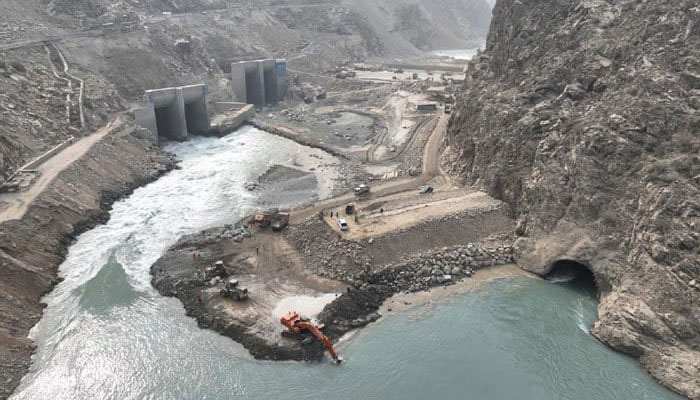Pakistan seeks Chinese help over two hydropower projects
Zhao Chenxin appreciated the role and leadership of the minister in making CPEC a success
BEIJING: The Minister for Planning, Development, and Special Initiatives, Prof. Ahsan Iqbal, held a meeting with the Vice Chairman of the National Development and Reform Commission (NDRC), Zhao Chenxin, at the NDRC headquarters here on Friday.
The minister was accompanied by the Special Assistant to the Prime Minister, Syed Tariq Fatemi, the Ambassador of Pakistan to China, Khalil Hashmi, and other senior officials of the embassy.
Recalling the launch of CPEC a decade ago, the minister said, “The decade of CPEC has been a remarkable journey. Since 2013, the relevant institutions from the two sides have worked as one team and successfully implemented key energy and physical infrastructure projects, laying a strong foundation for the next phase of CPEC.”
Zhao Chenxin appreciated the role and leadership of the minister in making CPEC a success.
While reviewing progress during the first phase of CPEC, both sides expressed their resolve to accelerate progress on the high-quality development of the project as it transitions to its next phase.
Recalling the five corridors announced by Vice Premier He Lifeng during his visit to Pakistan last year, the minister renewed the commitment of the government to even further enhance the socio-economic benefits of CEPC, with significant improvements to the lives and livelihoods of the people.
Emphasising the importance of deepening bilateral energy cooperation, Ahsan Iqbal conveyed to the Chinese side the interest of the government of Pakistan to diversify the country’s energy mix through the transition towards clean and renewable energy. In that context, he sought the Chinese government’s continued cooperation and support for the early implementation of the Azad Pattan and Kohala Hydel Power Projects.
Recalling the consensus achieved by both leaderships on the early implementation of ML-I and KKH realignment projects, Ahsan Iqbal reiterated the strategic significance of these projects and highlighted the benefits of enhanced connectivity for both countries. In that context, both sides agreed to accelerate internal procedures for the early implementation of these projects.
Both sides also discussed enhancing road and highway infrastructure cooperation, including by signing four MoUs for launching technical studies on the D.I. Khan-Zhob Road, Mirpur-Muzaffarabad-Manshehra Motorway, Babusar Tunnel, and Karachi-Hyderabad Motorway.
Underscoring the importance of industrial cooperation, both sides agreed to implement the Industrial Cooperation Framework Agreement and develop an action plan for the modernization of industry, agriculture, and mines and mineral sectors. Both China and Pakistan would prioritise cooperation on artificial intelligence and agriculture modernisation in the second phase of CPEC. The socio-economic development of Balochistan, including Gwadar, remains a top priority for both governments. In that context, both sides agreed to enhance the connectivity of the coastal city of Gwadar, including by constructing the Eastbay Motorway to fully harness the potential of its port and industrial zone. Both sides also agreed to hold the next round of the CPEC Joint Coordination Committee (JCC), to be co-chaired by the Minister for Planning, Development, and Special Initiatives, before the prime minister visited China.
-
 'Euphoria' Star Eric Made Deliberate Decision To Go Public With His ALS Diagnosis: 'Life Isn't About Me Anymore'
'Euphoria' Star Eric Made Deliberate Decision To Go Public With His ALS Diagnosis: 'Life Isn't About Me Anymore' -
 Toy Story 5 Trailer Out: Woody And Buzz Faces Digital Age
Toy Story 5 Trailer Out: Woody And Buzz Faces Digital Age -
 Andrew’s Predicament Grows As Royal Lodge Lands In The Middle Of The Epstein Investigation
Andrew’s Predicament Grows As Royal Lodge Lands In The Middle Of The Epstein Investigation -
 Rebecca Gayheart Unveils What Actually Happened When Ex-husband Eric Dane Called Her To Reveal His ALS Diagnosis
Rebecca Gayheart Unveils What Actually Happened When Ex-husband Eric Dane Called Her To Reveal His ALS Diagnosis -
 What We Know About Chris Cornell's Final Hours
What We Know About Chris Cornell's Final Hours -
 Scientists Uncover Surprising Link Between 2.7 Million-year-old Climate Tipping Point & Human Evolution
Scientists Uncover Surprising Link Between 2.7 Million-year-old Climate Tipping Point & Human Evolution -
 NASA Takes Next Step Towards Moon Mission As Artemis II Moves To Launch Pad Operations Following Successful Fuel Test
NASA Takes Next Step Towards Moon Mission As Artemis II Moves To Launch Pad Operations Following Successful Fuel Test -
 GTA 6 Price Leaked Online Ahead Of Rockstar Announcement
GTA 6 Price Leaked Online Ahead Of Rockstar Announcement -
 Eric Dane Got Honest About His Struggle With ALS In Final Public Appearance: 'No Reason To Be In A Good Spirit'
Eric Dane Got Honest About His Struggle With ALS In Final Public Appearance: 'No Reason To Be In A Good Spirit' -
 Google AI Overviews And Mental Health: Why Experts Say It’s ‘very Dangerous’
Google AI Overviews And Mental Health: Why Experts Say It’s ‘very Dangerous’ -
 Prince Harry Issues A Statement For His 'incredible' WellChild Children
Prince Harry Issues A Statement For His 'incredible' WellChild Children -
 5 Famous Celebrities Who Beat Cancer
5 Famous Celebrities Who Beat Cancer -
 Spinosaurus Mirabilis: New Species Ready To Take Center Stage At Chicago Children’s Museum In Surprising Discovery
Spinosaurus Mirabilis: New Species Ready To Take Center Stage At Chicago Children’s Museum In Surprising Discovery -
 ByteDance Expands Artificial Intelligence Operations In US
ByteDance Expands Artificial Intelligence Operations In US -
 Angelina Jolie’s Breast Cancer Surgeon Appreciates Her For Calling Scars 'a Choice': 'They Are Choices To Survive'
Angelina Jolie’s Breast Cancer Surgeon Appreciates Her For Calling Scars 'a Choice': 'They Are Choices To Survive' -
 Detective Chief Inspector Reveals How Andrew Got Treated In Police Custody
Detective Chief Inspector Reveals How Andrew Got Treated In Police Custody




